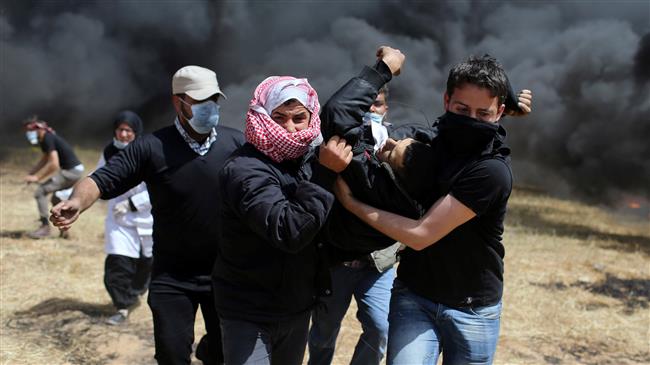
RNA - AFP reported clashes between stone-throwing protesters and Israeli troops at two locations.
Thousands are expected to participate in the third Friday of the March of Return Rallies, which fist began on March 30. Large groups of people have already arrived at the fence separating Gaza from the Israeli-occupied territories.
As this Friday’s theme, protesters plan to burn Israeli flags and hoist Palestinian flags instead along the Gaza border.
The Israeli regime has deployed snipers and tanks ahead of the protest.
More than 30 Palestinians have been killed by Israeli forces in the first two weeks of the rallies.
In the latest fatalities, two Palestinian were on Thursday killed by Israeli forces, one was shot in the chest during a protest rally in Khuza’a, near the town of Khan Younis, and the other one was hit by an Israeli air raid.
The protesters are being shot while posing no threat to soldiers. The regime’s snipers have permission to open fire on unarmed Gazans.
On Tuesday, the Israeli army said a sniper who shot an unarmed Palestinian near the Gaza border in a recently circulated video had been cleared of wrongdoing by a military inquiry.
In the video, which was widely shared on Twitter and WhatsApp messaging application Monday, the troops can be heard talking about the target and how to shoot him, as the sniper trains his rifle on the Palestinian, who does not appear to be armed and is several meters away from Gaza’s fence.
The Israeli military said that the sharpshooter behaved appropriately but criticized the soldier who filmed and cheered the incident for what it called violating military values.
Israel’s minister of military affairs Avigdor Lieberman praised the sharpshooter on Tuesday, saying, “The sniper deserves a medal, the photographer a court martial.”
The footage has drawn widespread condemnation from Israeli lawmakers and human rights organizations.
Rights bodies have argued that the video represents what is the rule for the Israeli army, rather than the exception.
The Return rallies culminate on May 15, the day Palestinians commemorate Nakba Day (Day of Catastrophe) when hundreds of thousands fled or were driven out of their homes in 1948 and Israel was created.
Palestine mufti bans selling land to enemy
Separately, the Palestinian mufti of Jerusalem al-Quds, Sheikh Mohammed Hussein, on Thursday published a fatwa, or Islamic religious decree, banning anyone “from giving up, or selling Jerusalem [al-Quds] and the land of Palestine to the enemy” — a reference to Israelis.
“Palestine, which includes Jerusalem [al-Quds], is Waqf (Islamic trust) land, and it is religiously forbidden to give it up or facilitate the transfer of its ownership to the enemy,” Hussein said in his fatwa. “Palestine is part of the Islamic public properties.”
Hussein said the transfer of ownership of Muslim-owned property to the “enemy” was illegal and “considered treason.”
Any Palestinian who sells his land to his enemy is a sinner,” he ruled.
The Palestinian mufti also ruled that it was forbidden for a Palestinian to accept compensation for his or her property from the “enemy” because this would mean assisting in the “eviction” of Muslims from their homes.
According to Press TV, the fatwa was issued on the eve of the Arab summit that is scheduled to convene in Saudi Arabia next week to discuss a number of issues, including US President Donald Trump’s announcement in December, to recognize Jerusalem al-Quds as the “capital” of Israel and move the embassy there from Tel Aviv.
The fatwa added that Jerusalem al-Quds was the “eternal capital of Palestine,” rejecting Trump’s decision to recognize Jerusalem al-Quds as Israel’s “capital” as illegitimate and null.
“Jerusalem and al-Aqsa Mosque are Islamic waqf until doomsday. They can’t be sold or given as gifts or passed on by inheritance. No one is entitled to give them up, or to give up Jerusalem or any part of it, or any part of al-Aqsa Mosque, to the enemy,” it said.
847/940